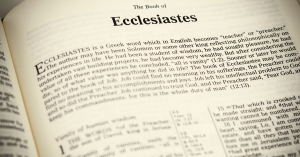Ecclesiastes, part of biblical wisdom literature, is a thought-provoking book that delves into the human experience, exploring themes of meaning, purpose, and the pursuit of wisdom.
Ecclesiastes: A Philosophical and Reflective Book
• Often attributed to King Solomon, characterized by a philosophical and reflective nature.
• Explores profound questions about life’s meaning, God’s nature, and human experience.
• Chapters 1, 2, 3, 9, and 12 contain reflections, observations, and wisdom on life, purpose, and the human condition.
• Ecclesiastes 3:11 expresses the idea that God makes everything beautiful in its time, reflecting on divine order and purpose in life events.
• Ecclesiastes 12: includes the famous passage advising “Remember your Creator in the days of your youth,” describing the challenges and eventual mortality of human life.

Background and Authorship: The authorship of Ecclesiastes is traditionally attributed to King Solomon, known for his wisdom. The book is a reflection on life’s complexities and uncertainties.
Historical Context of Ecclesiastes: Set against the backdrop of ancient Israel, Ecclesiastes provides insights into the socio-cultural and historical context of the time.
Themes and Key Messages: Ecclesiastes addresses existential themes, emphasizing the transient nature of life, the pursuit of wisdom, and the quest for meaning amid life’s challenges.
Theological Perspective of Ecclesiastes: The book offers a theological exploration of life, acknowledging the limitations of human understanding and emphasizing reliance on God.
The Meaning of the Title “Ecclesiastes”: The title, derived from the Greek word “Ecclesiastes,” refers to one who addresses an assembly. It reflects the book’s contemplative and reflective nature.
Overview of the Structure and Content: Ecclesiastes comprises reflections, observations, and philosophical musings, often presented in a poetic and aphoristic style.
Interpreting and Understanding the Book: Understanding Ecclesiastes requires interpreting its wisdom literature context, acknowledging its nuanced perspectives, and appreciating its literary style.
The Role of Qoheleth (the Preacher): Qoheleth, often translated as “the Preacher” or “the Teacher,” serves as the book’s persona, sharing wisdom and reflections on life.
The Search for Meaning and Purpose in Life: Ecclesiastes explores the human quest for purpose, urging readers to consider life’s meaning in the grander scheme.
The Vanity of Earthly Pursuits: The theme of vanity underscores the fleeting nature of worldly pursuits, challenging conventional notions of success and achievement.
The Futility of Wisdom and Knowledge: Even wisdom and knowledge, though valuable, are portrayed as ultimately limited and unable to provide complete understanding.
The Concept of “Under the Sun”: The phrase “under the sun” represents life on earth, emphasizing the book’s focus on human experiences and earthly realities.
The Importance of Enjoying the Present Moment: Ecclesiastes encourages readers to find joy in the present, appreciating life’s simple pleasures.
The Role of Fear and Obedience in Life: The book underscores the significance of fearing God and obeying His commands as foundational to a meaningful life.
Lessons on Wealth, Success, and Material Possessions: Ecclesiastes challenges societal pursuits of wealth and success, highlighting their transitory nature.
Facing the Inevitability of Death: Death is a recurring theme, prompting reflection on life’s brevity and the importance of living with purpose.
Comparing Ecclesiastes to Other Biblical Wisdom Literature: Examining Ecclesiastes alongside other wisdom literature, such as Proverbs and Job, provides a holistic understanding of biblical wisdom.
Relevance and Application of Ecclesiastes Today: Ecclesiastes remains relevant, offering timeless wisdom applicable to modern challenges and prompting reflection on contemporary life.
Final Thoughts and Conclusion: Ecclesiastes concludes with a call to fear God and keep His commandments, providing a foundation for a purposeful and meaningful life. The book challenges readers to contemplate life’s complexities and embrace a perspective grounded in reverence for the divine.



